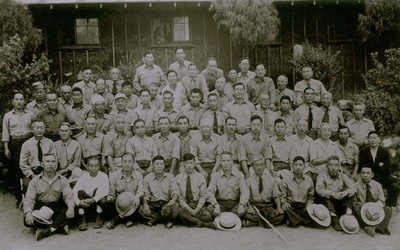>> Part 1
Data
Each of the interviews conducted so far have been with Nisei, or second generation Japanese Americans, who grew up in Oregon and were the children of men who were arrested by the FBI following the December, 1941 bombing of Pearl Harbor. All of the interviewees cited changes in their world views and in their families due to the internment experience, of which the early arrests of their fathers were a significant part.
One interviewee, who grew up in Hood River, Oregon, told the story of his father, a highly successful businessman and community leader. His father was the only Japanese member of the area Rotary Club, and was very skilled at the English language; he could speak well with an accent, read, write, and even type. He was one of eight Issei, or first generation Japanese Americans, from Oregon who were invited to Tokyo to commemorate of the 2600th anniversary of the Japanese empire.
At this celebration, he was presented with the Paulownia Cup, a prestigious award meant to honor his attempts at promoting harmonious relations between the United States and Japan. This recognition of his prominent role in his adopted American community was later construed by Department of Justice camp personnel as a sign of his “intense devotion” to the Japanese emperor, and a reason why he should remain isolated from his family for the duration of World War II.
Like many other arrestees, he was held in a Portland jail for several weeks before being transferred to a number of camps run by the Army and the Department of Justice throughout the war: Missoula, Montana; Fort Sill, Oklahoma; Fort Livingston, Louisiana; Santa Fe, New Mexico. Internees were often offered hearings in these camps in order to determine their retention in separate camps or their release back to their families (who had by this time been evacuated as part of the wholesale Japanese American internment).

Inmates at Santa Fe internment camp, New Mexico, ca. 1943. Many of these men were Oregon Issei. Courtesy of Oregon Nikkei Endowment, Portland, OR
According to this interviewee, these hearings were a farce. His brother was a lawyer, and attended the hearing for their father that was held in early 1942 at Missoula, Montana. At these hearings, the internees could make use of witnesses, but not people who could defend them. At this particular arrestee’s hearing in Montana, officials used as evidence drawings of the workings of the Panama Canal that had been found in a search of his house. Although the drawings had been made by one of his children as an assignment for school, officials insisted that this “evidence” showed that he intended to blow up the Panama Canal, and thus was dangerous to national security.
In the end, he was not released back to his family until January of 1946, months after Japan’s surrender. He was so embittered that he never wanted to return to the farming community of Hood River that he had once loved and played such an active role in. He made his home in Portland, Oregon, as former friends called him a spy and he was written up as such in the local Hood River papers. Wary and later absolutely paranoid, he eventually took his own life.
Although not all of the internees whose children we interviewed were devastated enough by their arrests to commit suicide, individuals and families were still affected to varying degrees. One interviewee recalled that whenever she or her siblings would ask her father about his experiences in camp, he would never say a word. She described her own puzzlement at the outbreak of the war and the arrest of her father: “We’re Japanese, but we’re born over here. And so you don’t relate to the whole picture that you might be an alien in other people’s eyes.”
The arrest of certain Japanese “enemy alien” men was indeed a rude awakening to many families that they would no longer be welcomed in their communities or viewed as good Americans. This interviewee cited how rumors began to fly after her father was taken away, as if neighbors were trying to find any possible sign that subversive activity existed. The pipe stack extending from their furnace was rumored to be used for shortwave radio transmissions for the purposes of spying. Not only did the mainstream community turn against Japanese families – especially those that had experienced an arrest by the FBI – Japanese community members began to suspect one another.
This interviewee’s father was a leader of Portland’s Japanese Chamber of Commerce, but she believes there was a spy within the Japanese community who was reporting the activities of the group to the FBI. The records the FBI had of her father, which she has since been able to obtain, include such detailed descriptions of the inner workings of the organization that she figures they must have come from somebody within.
The interviewee whose father’s story was told in the introduction remembers going to school the day after her father was arrested and being shocked to learn that two Japanese American girls that she knew still had their fathers at home; nobody had come to take them away. She couldn’t understand why her father was targeted.
This consternation and confusion was one way that the FBI arrests served to break down communities. Not only were many of the leaders in the Japanese American community suddenly gone, but no one knew who would be arrested next or exactly how the selections were being made. This interviewee cited this incident as a major turning point in her thinking about the world: “A lot of it is just anger…to this day, I still live by those angry feelings.”
Not only were individuals and families deeply affected, but the way that Japanese people in the community were viewed changed as well. Ramifications of these views continue to exist today. Another interviewee cites a recent example which shows the irreparable damage that the FBI arrests did to the reputations of Japanese Americans:
I think a lot of people don't really understand what happened. Literally, my neighbor was talking to me once, and he somehow still thinks there were spies who were caught and prosecuted. I don't care to argue a point other than I said, “The FBI has reported never during World War II was an American citizen, or I don't think even an Issei, accused and proven to be a saboteur or a spy.” Somehow other people just think, “Oh, if they took them away from the coast, there was a reason, and that's because they were active spies or saboteurs.”
As was seen in the example of the first interviewee, arrestees were often unwelcome in their home communities. So potent was the prejudice which had been used to justify the FBI arrests and the wholesale internment that community members began believing claims and accusations for which there was no proof, simply because that was what they expected.
The Oregonian, the local Portland, Oregon newspaper, reported on December 8, 1941, the day after the bombing of Pearl Harbor, that “only certain men who it was suspected might be trouble-makers were being picked up at this time….These men, it was understood, had been under investigation by bureau agents for some time.”
Enemy aliens, spies, suspected trouble-makers, potential saboteurs. Regardless of what kind of rhetoric was used to justify the arrests of these innocent victims, none was good. Communities learned to eye the arrestees just as they were described: with suspicion and distrust at best.
Significance
The lessons to be gleaned from these stories are many and significant. The resounding theme through the different interviews was the importance of remaining ever-vigilant lest certain groups be denied civil rights again. Multiple interviewees were fearful that such incidents of prejudice and hate would be repeated, especially after the events of September 11, 2001 led to suspicion of Arab and Muslim Americans.
One interviewee was quite pessimistic about humans’ potential to overcome such beliefs: “I don’t think human nature is going to change….The basic nature of people is they just have all these prejudices.” These prejudices are especially evident when people are dealing with members of other racial and ethnic groups. They tend to generalize about all members of a specific group, just as they did about the Japanese Americans during World War II.
As this research shows, human beings are capable of being very unreasonable, especially if they allow their emotions to lead them toward drastic, unfounded actions. Although many now agree that the FBI arrests and the internment were wrong, the emotional scars and harmful, prejudicial views from past wrongdoings still remain.
Future Directions
As the responses keep coming from community members who are interested in assisting with the exhibit, hopefully many more of their stories will be incorporated into the final product. I have not yet fully decided what my role in developing the final December, 2010, exhibit will be, but I hope to at least remain abreast of any progress made and available to provide my input. Working as a member of a committee on this project was rewarding because it is possible for work on the project to continue even after my summer experience ended.
Personally, my interest was piqued by the rationale that the government used to justify the FBI arrests, and I hope to perform more research into this area of interest. Of course, I will always be interested in the human faces of these stories, and any future research I conduct in this area will be driven by the memory of the teenage girl who visited her father while he was behind bars for crimes he did not commit, and then never saw him alive again.
* * * * *
UPCOMING EXHIBITION
Taken: FBI
December 8, 2010 - May 29, 2011
at Oregon Nikkei Legacy Center
This exhibit brings to light the experiences of the families of 118 individuals in the Portland area and 17,477 in the western states taken into custody by the local authorities, then imprisoned by the FBI and U.S. Department of Justice directly following the Japanese bombing of Pearl Harbor on December 7, 1941.
* * * * *
© 2010 Jill Yuzuriha



